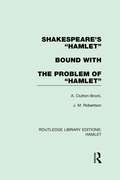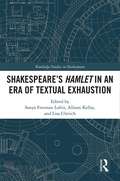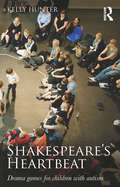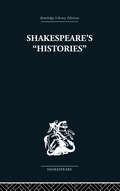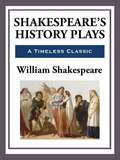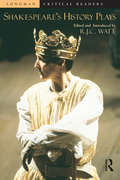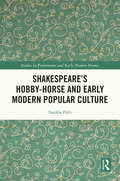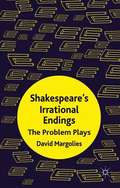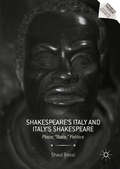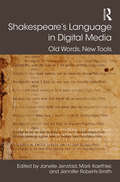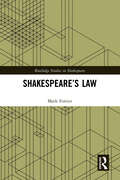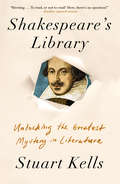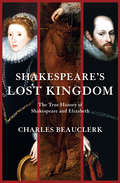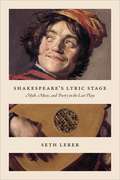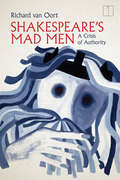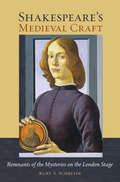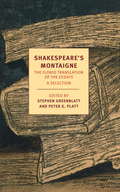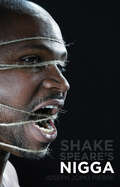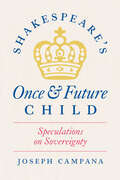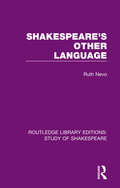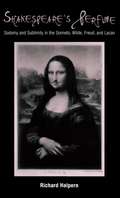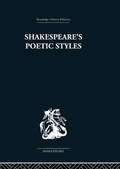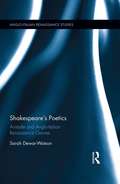- Table View
- List View
Shakespeare's Hamlet bound with The Problem of Hamlet (Routledge Library Editions: Hamlet)
by A. Clutton-Brock J. M. RobertsonThis volume combines two classic works on Hamlet, first published in 1919 and 1922. The first book's original description says that it contains a theory which attempts to explain an everlasting problem - it insists that Hamlet is neither a failure not an accident, but a very great work of art. In a final chapter, the play is examined as an aesthetic document. It is a profoundly interesting and not unprovocative work. The second book reviews and attempts to resolve the most interesting debate of any Shakespeare play and presents proper method for investigating the genesis of the plays in this way.
SHAKESPEARE’S HAMLET IN AN ERA OF TEXTUAL EXHAUSTION (Routledge Studies in Shakespeare)
by Sonya Freeman Loftis Allison Kellar Lisa Ulevich"Post-Hamlet: Shakespeare in an Era of Textual Exhaustion" examines how postmodern audiences continue to reengage with Hamlet in spite of our culture’s oversaturation with this most canonical of texts. Combining adaptation theory and performance theory with examinations of avant-garde performances and other unconventional appropriations of Shakespeare’s play, Post-Hamlet examines Shakespeare’s Hamlet as a central symbol of our era’s "textual exhaustion," an era in which the reader/viewer is bombarded by text—printed, digital, and otherwise. The essays in this edited collection, divided into four sections, focus on the radical employment of Hamlet as a cultural artifact that adaptors and readers use to depart from textual "authority" in, for instance, radical English-language performance, international film and stage performance, pop-culture and multi-media appropriation, and pedagogy.
Shakespeare's Heartbeat: Drama games for children with autism
by Kelly HunterChildren on the autistic spectrum experience varying degrees of difficulties; all of which can be understood as a disassociation of mind and body. Expressing feelings, making eye contact, keeping a steady heartbeat and recognizing faces are all part of the autism dilemma which can be poetically explored by Shakespeare. Over ten years, Hunter worked with children on all points of the spectrum, developing drama games for the specific purpose of combatting autism. These unique games, derived from specific moments in the plays, shed new light on how to teach Shakespeare to children, using the drama as an exploration of how it feels to be alive. Shakespeare’s Heartbeat is a step-by-step guide, detailing how to demonstrate, play and share these sensory games. The book includes: Games based on A Midsummer Night’s Dream Games based on The Tempest Tips and advice for playing one-on-one with the children An afterword describing Hunter’s journey from performer and practitioner to creator of this work. Shakespeare’s poetic definitions of seeing, thinking and loving reveal the very processes that children with autism find so difficult to achieve. This book provides an indispensable learning tool for those wishing to encourage children’s eye contact and facial expression, improve their spatial awareness and language skills and introduce them to imaginative play.
Shakespeare's History: Mirrors of Elizabethan Policy.
by Lily B CampbellFirst published in 1947 in the USA. This edition reprints the first UK edition of 1964. Published to critical acclaim, the central argument of this book is that the historical play must be studied as a genre separate from tragedy and comedy. Just as there is in Shakespearean tragedies a dominant ethical pattern of passion opposed to reason, so there is in the history plays a dominant political pattern characteristic of the political philosophy of the age. From the 'troublesome reign' of King John to the 'tragical doings' of Richard III, Shakespeare wove the events of English history into plots of universal interest.
Shakespeare's History Plays
by William ShakespeareA collection containing The First Part of King Henry IV, The Second Part of King Henry IV, The Life of King Henry V, The First Part of King henry VI, The Second Part of King Henry VI, The Third Part of King Henry VI, King Henry VIII, King John, King Richard II, and King Richard III
Shakespeare's History Plays (Longman Critical Readers)
by Robert WattShakespeare's history plays are central to his dramatic achievement. In recent years they have become more widely studied than ever, stimulating intensely contested interpretations, due to their relevance to central contemporary issues such as English, national identities and gender roles. Interpretations of the history plays have been transformed since the 1980s by new theoretically-informed critical approaches. Movements such as New Historicism and cultural materialism, as well as psychoanalytical and post-colonial approaches, have swept away the humanist consensus of the mid-twentieth century with its largely conservative view of the plays. The last decade has seen an emergence of feminist and gender-based readings of plays which were once thought overwhelmingly masculine in their concerns. This book provides an up-to-date critical anthology representing the best work from each of the modern theoretical perspectives. The introduction outlines the changing debate in an area which is now one of the liveliest in Shakespearean criticism.
Shakespeare’s Hobby-Horse and Early Modern Popular Culture (Studies in Performance and Early Modern Drama)
by Natália PikliThis book explores the ways in which the early modern hobby-horse featured in different productions of popular culture between the 1580s and 1630s. Natália Pikli approaches this study with a thorough and interdisciplinary examination of hobby-horse references, with commentary on the polysemous uses of the word, offers an informative background to reconsider well-known texts by Shakespeare and others, and provides an overview on the workings of cultural memory regarding popular culture in early modern England. The book will appeal to those with interest in early modern drama and theatre, dramaturgy, popular culture, cultural memory, and iconography.
Shakespeare's Individualism
by Peter HolbrookProviding a provocative and original perspective on Shakespeare, Peter Holbrook argues that Shakespeare is an author friendly to such essentially modern and unruly notions as individuality, freedom, self-realization and authenticity. These expressive values vivify Shakespeare's own writing; they also form a continuous, and a central, part of the Shakespearean tradition. Engaging with the theme of the individual will in specific plays and poems, and examining a range of libertarian-minded scholarly and literary responses to Shakespeare over time, Shakespeare's Individualism advances the proposition that one of the key reasons for reading Shakespeare today is his commitment to individual liberty - even as we recognize that freedom is not just an indispensable ideal but also, potentially, a dangerous one. Engagingly written and jargon free, this book demonstrates that Shakespeare has important things to say about fundamental issues of human existence.
Shakespeare�s Irrational Endings
by David MargoliesProblem Plays' has been an awkward category for those Shakespeare plays that don't fit the conventional groupings. Expanding from the traditional three plays to six, the book argues that they share dramatic structures designed intentionally by Shakespeare to disturb his audience by frustrating their expectations.
Shakespeare's Italy and Italy's Shakespeare
by Shaul BassiShaul Bassi is AssociateProfessor of English and Postcolonial Literature at Ca'Foscari University ofVenice, Italy. His publications include Visionsof Venice in Shakespeare, with Laura Tosi, and Experiences of Freedom in Postcolonial Literatures and Cultures, with Annalisa Oboe.
Shakespeare's Language in Digital Media: Old Words, New Tools (Digital Research in the Arts and Humanities)
by Janelle Jenstad Mark Kaethler Jennifer Roberts-SmithThe authors of this book ask how digital research tools are changing the ways in which practicing editors historicize Shakespeare's language. Scholars now encounter, interpret, and disseminate Shakespeare's language through an increasing variety of digital resources, including online editions such as the Internet Shakespeare Editions (ISE), searchable lexical corpora such as the Early English Books Online-Text Creation Partnership (EEBO-TCP) or the Lexicons of Early Modern English (LEME) collections, high-quality digital facsimiles such as the Folger Shakespeare Library's Digital Image Collection, text visualization tools such as Voyant, apps for reading and editing on mobile devices, and more. What new insights do these tools offer about the ways Shakespeare's words made meaning in their own time? What kinds of historical or historicizing arguments can digital editions make about Shakespeare's language? A growing body of work in the digital humanities allows textual critics to explore new approaches to editing in digital environments, and enables language historians to ask and answer new questions about Shakespeare's words. The authors in this unique book explicitly bring together the two fields of textual criticism and language history in an exploration of the ways in which new tools are expanding our understanding of Early Modern English.
Shakespeare's Law (Routledge Studies in Shakespeare)
by Mark FortierShakespeare's Law is a critical overview of law and legal issues within the life, career, and works of William Shakespeare as well as those that arise from the endless array of activities that happen today in the name of Shakespeare. Mark Fortier argues that Shakespeare’s attitudes to law are complex and not always sanguine, that there exists a deep and perhaps ultimate move beyond law very different from what a lawyer or legal scholar might recognize. Fortier looks in detail at the legal issues most prominent across Shakespeare’s work: status, inheritance, fraud, property, contract, tort (especially slander), evidence, crime, political authority, trials, and the relative value of law and justice. He also includes two detailed case studies, of The Merchant of Venice and Measure for Measure, as well as a chapter looking at law in works by Shakespeare's contemporaries. The book concludes with a chapter on the law as it relates to Shakespeare today. The book shows that the legal issues in Shakespeare are often relevant to issues we face now, and the exploration of law in Shakespeare is as germane today, though in sometimes new ways, as in the past.
Shakespeare's Library: Unlocking the Greatest Mystery in Literature
by Stuart KellsA tantalizing true story of one of literature’s most enduring enigmas is at the heart of this “lively, even sprightly book” (Michael Dirda, The Washington Post)—the quest to find the personal library of the world’s greatest writer.Millions of words of scholarship have been expended on the world’s most famous author and his work. And yet a critical part of the puzzle, Shakespeare’s library, is a mystery. For four centuries people have searched for it: in mansions, palaces and libraries; in riverbeds, sheep pens and partridge coops; and in the corridors of the mind. Yet no trace of the bard’s manuscripts, books or letters has ever been found.The search for Shakespeare’s library is much more than a treasure hunt. Knowing what the Bard read informs our reading of his work, and it offers insight into the mythos of Shakespeare and the debate around authorship. The library’s fate has profound implications for literature, for national and cultural identity, and for the global Shakespeare industry. It bears on fundamental principles of art, identity, history, meaning and truth.Unfolding the search like the mystery story that it is, acclaimed author Stuart Kells follows the trail of the hunters, taking us through different conceptions of the library and of the man himself. Entertaining and enlightening, Shakespeare’s Library is a captivating exploration of one of literature’s most enduring enigmas."An engaging and provocative contribution to the unending world of Shakespeariana . . . An enchanting work that bibliophiles will savor and Shakespeare fans adore." ―Kirkus Reviews
Shakespeare’s Literary Lives
by Paul FranssenThis is an entertaining account of Shakespeare's afterlives in fiction. Paul Franssen offers the first sustained analysis of stories and films that involve the character of Shakespeare. Taking a broad international and historical perspective, he shows how fictions about Shakespeare help us understand what he meant to a certain age, nation, or author, and how they have become a vital aspect of the Shakespeare industry. Appearing sometimes as a ghost or time-traveller, fictional Shakespeares have been made to speak to many issues, such as the French Revolution, the Irish conflict, colonialism, the Anglo-American relationship, sexual orientation, race and class. Written in an accessible style, this book will appeal to advanced students as well as academic researchers in Shakespeare studies, film and cultural studies, literary reception and creative writing.
Shakespeare's Lost Kingdom: The True History of Shakespeare and Elizabeth
by Charles Beauclerk“A book for anyone who loves Shakespeare . . . One of the most scandalous and potentially revolutionary theories about the authorship of these immortal works” (Mark Rylance, First Artistic Director of Shakespeare’s Globe Theatre). It is perhaps the greatest story never told: the truth behind the most enduring works of literature in the English language, perhaps in any language. Who was William Shakespeare? Critically acclaimed historian Charles Beauclerk has spent more than two decades researching the authorship question, and if the plays were discovered today, he argues, we would see them for what they are—shocking political works written by a court insider, someone with the monarch’s indulgence, shielded from repression in an unstable time of armada and reformation. But the author’s identity was quickly swept under the rug after his death. The official history—of an uneducated merchant writing in near obscurity, and of a virginal queen married to her country—dominated for centuries. Shakespeare’s Lost Kingdom delves deep into the conflicts and personalities of Elizabethan England, as well as the plays themselves, to tell the true story of the “Soul of the Age.” “Beauclerk’s learned, deep scholarship, compelling research, engaging style and convincing interpretation won me completely. He has made me view the whole Elizabethan world afresh. The plays glow with new life, exciting and real, infused with the soul of a man too long denied his inheritance.” —Sir Derek Jacobi
Shakespeare's Lyric Stage: Myth, Music, and Poetry in the Last Plays
by Seth LererWhat does it mean to have an emotional response to poetry and music? And, just as important but considered less often, what does it mean not to have such a response? What happens when lyric utterances—which should invite consolation, revelation, and connection—somehow fall short of the listener’s expectations? As Seth Lerer shows in this pioneering book, Shakespeare’s late plays invite us to contemplate that very question, offering up lyric as a displaced and sometimes desperate antidote to situations of duress or powerlessness. Lerer argues that the theme of lyric misalignment running throughout The Tempest, The Winter’s Tale, Henry VIII, and Cymbeline serves a political purpose, a last-ditch effort at transformation for characters and audiences who had lived through witch-hunting, plague, regime change, political conspiracies, and public executions. A deep dive into the relationship between aesthetics and politics, this book also explores what Shakespearean lyric is able to recuperate for these “victims of history” by virtue of its disjointed utterances. To this end, Lerer establishes the concept of mythic lyricism: an estranging use of songs and poetry that functions to recreate the past as present, to empower the mythic dead, and to restore a bit of magic to the commonplaces and commodities of Jacobean England. Reading against the devotion to form and prosody common in Shakespeare scholarship, Lerer’s account of lyric utterance’s vexed role in his late works offers new ways to understand generational distance and cultural change throughout the playwright’s oeuvre.
Shakespeare's Mad Men: A Crisis of Authority (Square One: First-Order Questions in the Humanities)
by Richard van OortThis book is about a mad king and a mad duke. With original and iconoclastic readings, Richard van Oort pioneers the reading of Shakespeare as an ethical thinker of the "originary scene," the scene in which humans became conscious of themselves as symbol-using moral and narrative beings. Taking King Lear and Measure for Measure as case studies, van Oort shows how the minimal concept of an anthropological scene of origin—the "originary hypothesis"—provides the basis for a new understanding of every aspect of the plays, from the psychology of the characters to the ethical and dialogical conflicts upon which the drama is based. The result is a gripping commentary on the plays. Why does Lear abdicate and go mad? Why does Edgar torture his father with non-recognition? Why does Lucio accuse the Duke in Measure for Measure of madness and lechery, and why does Isabella remain silent at the end? In approaching these and other questions from the perspective of the originary hypothesis, van Oort helps us to see the ethical predicament of the plays, and, in the process, makes Shakespeare new again.
Shakespeare’s Medieval Craft: Remnants of the Mysteries on the London Stage
by Kurt A. SchreyerIn Shakespeare's Medieval Craft, Kurt A. Schreyer explores the relationship between Shakespeare’s plays and a tradition of late medieval English biblical drama known as mystery plays. Scholars of English theater have long debated Shakespeare’s connection to the mystery play tradition, but Schreyer provides new perspective on the subject by focusing on the Chester Banns, a sixteenth-century proclamation announcing the annual performance of that city’s cycle of mystery plays. Through close study of the Banns, Schreyer demonstrates the central importance of medieval stage objects—as vital and direct agents and not merely as precursors—to the Shakespearean stage. As Schreyer shows, the Chester Banns serve as a paradigm for how Shakespeare’s theater might have reflected on and incorporated the mystery play tradition, yet distinguished itself from it. For instance, he demonstrates that certain material features of Shakespeare’s stage—including the ass’s head of A Midsummer Night’s Dream, the theatrical space of Purgatory in Hamlet, and the knocking at the gate in the Porter scene of Macbeth—were in fact remnants of the earlier mysteries transformed to meet the exigencies of the commercial London playhouses. Schreyer argues that the ongoing agency of supposedly superseded theatrical objects and practices reveal how the mystery plays shaped dramatic production long after their demise. At the same time, these medieval traditions help to reposition Shakespeare as more than a writer of plays; he was a play-wright, a dramatic artisan who forged new theatrical works by fitting poetry to the material remnants of an older dramatic tradition.
Shakespeare's Montaigne
by Peter G. Platt Stephen Greenblatt John Florio Michel De MontaigneAn NYRB Classics OriginalShakespeare, Nietzsche wrote, was Montaigne's best reader--a typically brilliant Nietzschean insight, capturing the intimate relationship between Montaigne's ever-changing record of the self and Shakespeare's kaleidoscopic register of human character. And there is no doubt that Shakespeare read Montaigne--though how extensively remains a matter of debate--and that the translation he read him in was that of John Florio, a fascinating polymath, man-about-town, and dazzlingly inventive writer himself.Florio's Montaigne is in fact one of the masterpieces of English prose, with a stylistic range and felicity and passages of deep lingering music that make it comparable to Sir Robert Burton's Anatomy of Melancholy and the works of Sir Thomas Browne. This new edition of this seminal work, edited by Stephen Greenblatt and Peter G. Platt, features an adroitly modernized text, an essay in which Greenblatt discusses both the resemblances and real tensions between Montaigne's and Shakespeare's visions of the world, and Platt's introduction to the life and times of the extraordinary Florio. Altogether, this book provides a remarkable new experience of not just two but three great writers who ushered in the modern world.
Shakespeare's Nigga
by Joseph Jomo PierreShakespeare holds the fate of several black slaves in his hands. Among them are the rebellious Aaron and the obedient Othello, who each have complicated relationships with Shakespeare's daughter, Judith. But a vital secret remains hidden that could untangle complex familial ties and change the course of their history.
Shakespeare's Once and Future Child: Speculations on Sovereignty
by Joseph CampanaA study of Shakespeare’s child figures in relation to their own political moment, as well as our own. Politicians are fond of saying that “children are the future.” How did the child become a figure for our political hopes? Joseph Campana’s book locates the source of this idea in transformations of childhood and political sovereignty during the age of Shakespeare, changes spectacularly dramatized by the playwright himself. Shakespeare’s works feature far more child figures—and more politically entangled children—than other literary or theatrical works of the era. Campana delves into this rich corpus to show how children and childhood expose assumptions about the shape of an ideal polity, the nature of citizenship, the growing importance of population and demographics, and the question of what is or is not human. As our ability to imagine viable futures on our planet feels ever more limited, and as children take up legal proceedings to sue on behalf of the future, it behooves us to understand the way past child figures haunt our conversations about intergenerational justice. Shakespeare offers critical precedents for questions we still struggle to answer.
Shakespeare's Other Language (Routledge Library Editions: Study of Shakespeare)
by Ruth NevoShakespeare’s last plays, the tragicomic Romances, are notoriously strange plays, riddled with fabulous events and incredible coincidences, magic and dream. These features have sometimes been interpreted as the carelessness of an of an aging dramatist weary of his craft, or justified as folklore motifs, suitable to the romance tale. But neither view explains the fascination and power these plays still exert. Originally published in 1987, Ruth Nevo’s book offers a reading of the plays which invokes the findings and methods of post-psychoanalytic semiotics. Drawing on a Lacanian model of the "textual unconscious", she embarks on searching analyses of Pericles, Cymbeline, The Winter’s Tale, and The Tempest, brilliantly illuminating their apparent absurdities and anomalies, their bizarre or preposterous events and obscurely motivated actions, their often puzzling syntax. Her investigation of the plays’ informing fantasies produces unified and enriched readings which serve both to rehabilitate those plays which have been less than highly thought of, and to disclose new significance in the acknowledged masterpieces.
Shakespeare's Perfume: Sodomy and Sublimity in the Sonnets, Wilde, Freud, and Lacan
by Richard HalpernStarting with St. Paul's argument that the Greeks were afflicted with homosexuality to punish their excessive love of statues, Richard Halpern uncovers a tradition in which aesthetic experience gives birth to the sexual—and thus reverses the Freudian thesis that erotic desire is sublimated into art. Rather, Halpern argues, sodomy was implicated with aesthetic categories from the very start, as he traces a connection between sodomy and the unrepresentable that runs from Shakespeare's Sonnets to Oscar Wilde's novella The Portrait of Mr. W.H., Freud's famous essay on Leonardo da Vinci, and Jacques Lacan's seminar on the ethics of psychoanalysis. Drawing on theology, alchemy, psychoanalysis, philosophy, and literary criticism, Shakespeare's Perfume explores how the history of aesthetics and the history of sexuality are fundamentally connected.
Shakespeare's Poetic Styles: Verse into Drama
by John BaxterFirst published in 1980. At their most successful, Shakespeare's styles are strategies to make plain the limits of thought and feeling which define the significance of human actions. John Baxter analyses the way in which these limits are reached, and also provides a strong argument for the idea that the power of Shakespearean drama depends upon the co-operation of poetic style and dramatic form. Three plays are examined in detail in the text: The Tragedy of Mustapha by Fulke Greville and Richard II and Macbeth by Shakespeare.
Shakespeare's Poetics: Aristotle and Anglo-Italian Renaissance Genres (Anglo-Italian Renaissance Studies)
by Sarah Dewar-WatsonThe startling central idea behind this study is that the rediscovery of Aristotle's Poetics in the sixteenth century ultimately had a profound impact on almost every aspect of Shakespeare's late plays”their sources, subject matter and thematic concerns. Shakespeare's Poetics reveals the generic complexity of Shakespeare's late plays to be informed by contemporary debates about the tonal and structural composition of tragicomedy. Author Sarah Dewar-Watson re-examines such plays as The Winter's Tale, Pericles and The Tempest in light of the important work of reception which was undertaken in Italy by pioneering theorists such as Giambattista Giraldi Cinthio (1504-73) and Giambattista Guarini (1538-1612). The author demonstrates ways in which these theoretical developments filtered from their intellectual base in Italy to the playhouses of early modern England via the work of dramatists such as Jonson and Fletcher. Dewar-Watson argues that the effect of this widespread revaluation of genre not only extends as far as Shakespeare, but that he takes a leading role in developing its possibilities on the English stage. In the course of pursuing this topic, Dewar-Watson also engages with several areas of current scholarly debate: the nature of Shakespeare's authorship; recent interest in and work on Shakespeare's later plays; and new critical work on Italian language-learning in Renaissance England. Finally, Shakespeare's Poetics develops current critical thinking about the place of Greek literature in Renaissance England, particularly in relation to Shakespeare.
